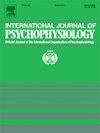在体力活动人群中,COVID-19感染史与心血管应激反应习惯紊乱有关
IF 2.5
3区 心理学
Q3 NEUROSCIENCES
引用次数: 0
摘要
目的2019冠状病毒病(COVID-19)具有对心血管和自主神经功能多重影响的特点。由于即时心血管功能极易受到精神压力的影响,这引发了人们对COVID-19对患者对心理压力和压力相关心血管并发症的恢复能力的潜在长期影响的担忧。然而,COVID-19对心血管应激反应的长期影响仍然相对未被探索。为了解决这一差距,我们研究了连续应激暴露期间和之后心血管功能的动态变化作为参与者COVID-19病史的函数。方法选取60名成年跑步俱乐部成员(平均年龄±SD = 44.85±9.64岁;50%男性;50%为女性),根据自我报告的COVID-19病史将其分为三组之一(从未患过COVID-19;1次感染COVID-19;多次感染COVID-19)。参与者接受了一个基于实验室的压力诱导方案,在此过程中,他们提出了两次心算挑战。在两次应激暴露之前和期间测量心率(HR)、收缩压(SBP)和舒张压(DBP),这有助于评估心血管应激反应的习惯化。结果COVID-19病史与心血管应激反应习惯化中断相关。具体而言,与第一次压力暴露相比,从未感染过COVID-19的人对第二次压力暴露的DBP反应较低,这表明在先前的研究中观察到的普通习惯。此外,在整个手术过程中,COVID-19病史与平均HR显著升高有关。结论反应习惯化是一种普通的机制,可以保护机体免受反复出现的日常压力的影响。如果COVID-19破坏了心血管系统反应的习惯化,那么过去经历过COVID-19的个体可能会留下挥之不去的影响,从而增加他们对未来压力相关心血管疾病的易感性。鉴于全球受COVID-19影响的人数众多,值得对这种潜在的长期影响进行全面调查。本文章由计算机程序翻译,如有差异,请以英文原文为准。
History of COVID-19 infection is associated with disrupted cardiovascular stress response habituation in physically active people
Objective
Coronavirus disease 2019 (COVID-19) is characterized by multiple effects on cardiovascular and autonomic functioning. As moment-to-moment cardiovascular function is highly susceptible to mental stress, this has spurred concerns regarding the potential long-term consequences of COVID-19 on sufferers' resilience to psychological stress and stress-related cardiovascular complications. However, the long-term after-effects of COVID-19 on cardiovascular stress reactivity profiles remain relatively unexplored. To address this gap, we investigated dynamic changes in cardiovascular function during and after successive stress exposures as a function of participants' COVID-19 histories.
Method
Our sample comprised 60 adult members of running clubs (mean age ± SD = 44.85 ± 9.64 yrs; 50 % male; 50 % female), who were classified into one of three groups based on self-reported history of COVID-19 (never had COVID-19; had COVID-19 once; had COVID-19 multiple times). Participants underwent a laboratory-based stress-induction protocol, during which a mental arithmetic challenge was presented twice. Heart rate (HR), systolic blood pressure (SBP), and diastolic blood pressure (DBP) were measured before and during both stress exposures, which facilitated an assessment of habituation of cardiovascular stress responses.
Results
History of COVID-19 was associated with disrupted cardiovascular stress response habituation. Specifically, persons classified as having never been infected with COVID-19 exhibited lower DBP responses to the second stress exposure compared to the first, indicative of ordinary habituation as observed in previous research. Furthermore, history of COVID-19 was associated with significantly elevated average HR throughout the procedure.
Conclusions
Response habituation is an ordinary mechanism that protects an organism from the rigors of recurring daily stress. If COVID-19 disrupts habituation of cardiovascular system responses, then individuals who have experienced COVID-19 in the past may be left with lingering effects that increase their susceptibility to future stress-related cardiovascular ill-health. Given the substantial number of people worldwide who have been affected by COVID-19, this potential long-lasting impact merits comprehensive investigation.
求助全文
通过发布文献求助,成功后即可免费获取论文全文。
去求助
来源期刊
CiteScore
5.40
自引率
10.00%
发文量
177
审稿时长
3-8 weeks
期刊介绍:
The International Journal of Psychophysiology is the official journal of the International Organization of Psychophysiology, and provides a respected forum for the publication of high quality original contributions on all aspects of psychophysiology. The journal is interdisciplinary and aims to integrate the neurosciences and behavioral sciences. Empirical, theoretical, and review articles are encouraged in the following areas:
• Cerebral psychophysiology: including functional brain mapping and neuroimaging with Event-Related Potentials (ERPs), Positron Emission Tomography (PET), Functional Magnetic Resonance Imaging (fMRI) and Electroencephalographic studies.
• Autonomic functions: including bilateral electrodermal activity, pupillometry and blood volume changes.
• Cardiovascular Psychophysiology:including studies of blood pressure, cardiac functioning and respiration.
• Somatic psychophysiology: including muscle activity, eye movements and eye blinks.

 求助内容:
求助内容: 应助结果提醒方式:
应助结果提醒方式:


